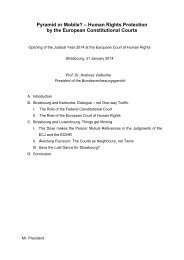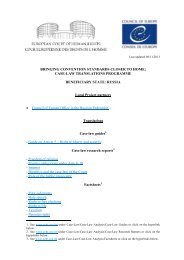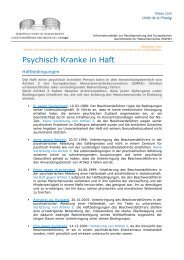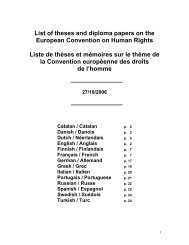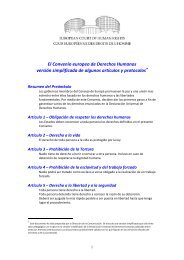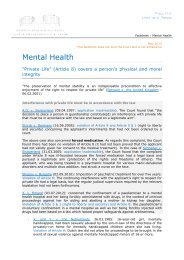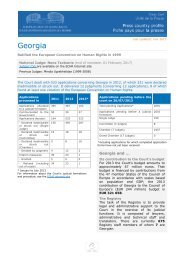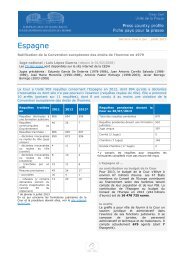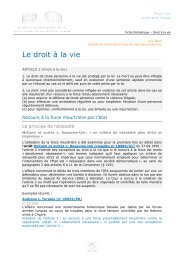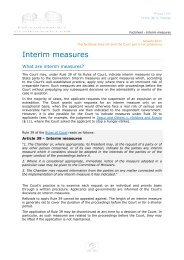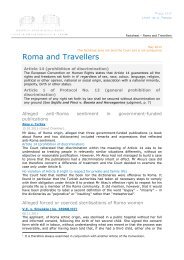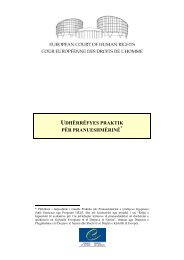The Conscience of Europe - European Court of Human Rights ...
The Conscience of Europe - European Court of Human Rights ...
The Conscience of Europe - European Court of Human Rights ...
You also want an ePaper? Increase the reach of your titles
YUMPU automatically turns print PDFs into web optimized ePapers that Google loves.
<strong>The</strong> <strong>Conscience</strong> <strong>of</strong> <strong>Europe</strong>: 50 Years <strong>of</strong> the <strong>Europe</strong>an <strong>Court</strong> <strong>of</strong> <strong>Human</strong> <strong>Rights</strong><br />
measures indicated by the <strong>Europe</strong>an <strong>Court</strong> <strong>of</strong> <strong>Human</strong> <strong>Rights</strong><br />
created legally binding obligations.<br />
In Paladi v. Moldova (2009) the respondent State was required<br />
to provide the applicant, a prisoner, with medical treatment. In its<br />
judgment the <strong>Court</strong> made it clear that it expected governments to<br />
comply with interim measures as a matter <strong>of</strong> urgency.<br />
In the Öcalan case (2005) Turkey was restrained from<br />
executing the death penalty should it be imposed on Abdullah<br />
Öcalan, the leader <strong>of</strong> the PKK (Workers’ Party <strong>of</strong> Kurdistan)<br />
separatist movement. In fact, Turkey abolished the death<br />
penalty altogether while the proceedings before the <strong>Court</strong> were<br />
still pending.<br />
In the Evans case (2007) the United Kingdom was required<br />
to preserve embryos that constituted a woman’s last chance <strong>of</strong><br />
ever giving birth, which she hoped to have implanted despite<br />
opposition from her former partner who no longer wished to be<br />
the father <strong>of</strong> her children.<br />
Situations such as those described above are unusual, and if<br />
interim measures are indicated, it is almost invariably to prevent<br />
the deportation <strong>of</strong> applicants to other countries, and the <strong>Court</strong><br />
will do so if it is satisfied that there is a risk to life or health.<br />
<strong>The</strong> number <strong>of</strong> interim measure requests has grown rapidly<br />
over the years. In 1989 there were 40, <strong>of</strong> which seven were<br />
granted. In 2009 no fewer than 654 provisional measures were<br />
indicated out <strong>of</strong> 2,399 requested.<br />
If interim measure requests appear urgent, as is <strong>of</strong>ten the<br />
case – in deportation cases they are sometimes received only<br />
minutes before the applicant is to board the aeroplane – the<br />
<strong>Court</strong> and its Registry will drop everything to give them absolute<br />
priority. As numbers increase, this results in a corresponding<br />
delay in the delivery <strong>of</strong> judgments and decisions.<br />
peter kempees<br />
Head <strong>of</strong> the Just Satisfaction Division in the Registry <strong>of</strong> the <strong>Court</strong><br />
ThE LibrAry<br />
Demonstration in support<br />
<strong>of</strong> Abdullah Öcalan.<br />
<strong>The</strong> Library has a long history <strong>of</strong> collecting material on human<br />
rights, and in particular on the <strong>Europe</strong>an human rights protection<br />
system, starting as far back as 1966 when it was established. In<br />
2002, when the Library became part <strong>of</strong> the <strong>Court</strong> administration,<br />
its mission was enlarged to include providing support to the <strong>Court</strong><br />
with its daily work. Now the purchased and donated material is<br />
not restricted to human rights topics but also covers the primary<br />
national literature needed for the judges and lawyers <strong>of</strong> the 47<br />
member States to carry out their work. Handling the <strong>Court</strong>’s work<br />
generates about 6,000 requests a year from <strong>Court</strong> staff to the<br />
library team. <strong>The</strong> range <strong>of</strong> questions is diverse and gives rise to a<br />
variety <strong>of</strong> responses, from preparing tailored bibliographies on a<br />
specific law subject, advising on literature, finding rare treaty texts,<br />
locating special titles in world libraries to taking time for training<br />
in efficient searching techniques. <strong>The</strong> Library’s reputation rests on<br />
the high level <strong>of</strong> its service.<br />
Even if the priority is given to in-house users, the Library<br />
does not close its doors to external visitors who are interested in<br />
exploring the rich collection for their own studies. In 2009 more than<br />
590 appointments were recorded for visitors from a range <strong>of</strong> legal<br />
backgrounds (students, lawyers, judges, academic scholars, writers<br />
and journalists) and from different geographical regions around the<br />
world. <strong>The</strong> external users are always eager to take advantage <strong>of</strong> the<br />
librarians’ research skills and the collection’s resources, and their<br />
appreciation filters through to the dedications to the Library and its<br />
staff that can <strong>of</strong>ten be found in the books they publish.<br />
<strong>The</strong> Library’s online tool is a catalogue that is accessible<br />
to everyone through the Internet. It holds about 50,000<br />
bibliographical records, most <strong>of</strong> which are in the two <strong>of</strong>ficial<br />
languages <strong>of</strong> the <strong>Court</strong> (English and French) but also in other<br />
languages, such as German, Italian and Russian. Although<br />
Chapter 4: Current Organization and Procedures<br />
84<br />
85<br />
the titles in the collection are available in many university or<br />
State libraries around the world, the <strong>Court</strong> library is unique in<br />
its analysis <strong>of</strong> this literature and in attributing specific subject<br />
headings to enable searching by single Articles <strong>of</strong> the <strong>Europe</strong>an<br />
Convention on <strong>Human</strong> <strong>Rights</strong> or by individual cases from the<br />
<strong>Court</strong>. Herein lies the value and richness <strong>of</strong> the collection,<br />
turning it from shelves <strong>of</strong> books into a knowledge bank on the<br />
Convention and its protection system.<br />
<strong>The</strong> aim <strong>of</strong> the Library is to continue <strong>of</strong>fering an appropriately<br />
stocked collection backed up by efficient service, certain <strong>of</strong> the<br />
authoritativeness and accuracy <strong>of</strong> the information it contains.<br />
<strong>The</strong> collection should be available to academics and researchers<br />
in <strong>Europe</strong> and beyond, supporting their contributions in the area<br />
<strong>of</strong> the <strong>Europe</strong>an <strong>Human</strong> <strong>Rights</strong> Convention and human rights in<br />
general an d guaranteeing an established practice and cultural<br />
tradition for human rights research.<br />
nora binder<br />
Head <strong>of</strong> the Library <strong>of</strong> the <strong>Court</strong>



